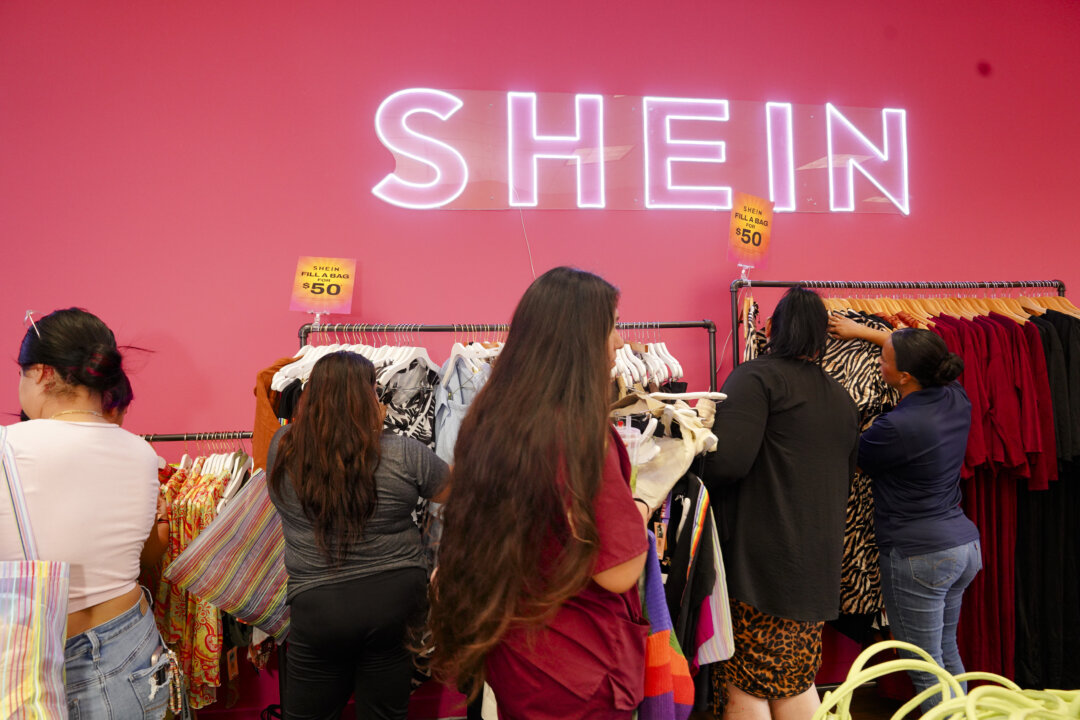Shein released its 2023 sustainability and social impact report on Aug. 22, confirming U.S. lawmakers’ concerns about labor violations by Shein’s Chinese suppliers.
During audits, the company uncovered two cases of child labor, defined as any person under the age of 15, or under the minimum age for employment in the local region or country. In China, the minimum age is set at 16.
The report states Shein suspended contracts with the manufacturers and that “both cases were resolved swiftly,” after which it resumed working with the manufacturers. The company found this was a decrease from 2022, when 0.3 percent of its audits uncovered child labor violations.
“In accordance with the SRS Policy in place at the time, errant suppliers were given 30 days to remediate their offenses,” the report reads. “Both cases were resolved swiftly, with remediation steps including terminating contracts with underage employees, ensuring the payment of any outstanding wages, arranging medical checkups and facilitating repatriation to parents/legal guardians as needed.”
Shein states that regulations in this area have been strengthened by requiring manufacturers to check identification and maintain records when screening new hires. It also updated its policy to terminate suppliers that violate child or forced labor regulations in the future.
The report did not identify cases of forced labor. The company had uncovered forced labor in 0.1 percent of audits in 2022.
It also found wage violations, such as paying below the local minimum wage or delaying payments, in 0.5 percent of audits conducted in China. All cases were remedied in 30 days, the report states.
The company relied mainly on third-party verification agencies to conduct an audit on 3,990 supplier and subcontractor sites in China, giving each a grade from A to E. It has more than 16,000 employees worldwide and works with about 5,800 contract manufacturers, according to the report.
Shein in 2023 terminated contracts with three suppliers for failing to remedy policy violations, one for receiving two consecutive failing grades, and one for refusing an audit. The majority (51 percent) of the suppliers received a grade of C, though the report does not detail the criteria for the grade levels.
Shein is a signatory to the U.N. Global Compact and is required to uphold international labor laws that prohibit the use of forced and child labor. The company added more specific language banning forced labor in its contracts last year, such as prohibiting suppliers from collecting recruitment fees or requiring workers to surrender their identification.
“Balancing remediation and penalization, we have supported our suppliers with training to address compliance risks within their operations, while taking the firm but necessary step to terminate working relationships where warranted,” Shein CEO Sky Xu wrote in a note prefacing the report.
Shein aims to reach net zero emissions by 2050, adopt additional internal initiatives to reduce greenhouse gas emissions, use renewable energy sources, and have a fully circular textile supply chain also by 2050.
In 2023, 72 percent of Shein’s electricity came from renewable sources, up from 68 percent in 2022, according to the report. This does not account for suppliers and subcontractors, but the report states new initiatives will aim at helping suppliers become more energy efficient.
Partnering with Apparel Impact Institute, Shein introduced energy and water waste reduction projects at 28 supplier sites, which are estimated to save 14,046 MWh of electricity and 46,000 metric tons of carbon emissions per year.
According to the report, Shein’s carbon emissions grew from 9.17 million metric tons in 2022 to 16.68 million metric tons in 2023, reflecting the company’s growth.
Shein, which describes its business model as “on-demand,” has grown quickly in the U.S. fast-fashion market since it entered in 2016. From March 2020 to March 2022, it more than doubled in market share from 18 to 40 percent, according to Statista, and remains the top-visited website in the fashion and apparel category in the United States, according to Similar Web.U.S. lawmakers have repeatedly raised concerns about labor violations in Chinese companies that sell goods to American consumers, as the Chinese Communist Party (CCP) is known to use forced labor camps. In recent months, there have been several confirmed cases of forced labor in China.
In 2022, the Uyghur Forced Labor Prevention Act (UFLPA) went into effect, prohibiting imports of forced labor products. The name of the act refers to the CCP’s persecution of the Uyghur ethnic minority in Xinjiang, which is known to involve forced labor.
The Xinjiang region accounts for 87 percent of China’s cotton production, according to a 2022 federal report. A recent study found that Xinjiang cotton was used in 19 percent of U.S. imports, up from 16 percent found in a third-party survey in 2022.
Bipartisan groups of lawmakers have repeatedly called on Shein to do more to ensure it is not benefitting from the CCP’s forced labor projects. Companies such as Shein and Temu have pointed out that UFLPA does not apply to their imports because the packages shipped from China to consumers are individually valued under $800 and not subject to inspection at the border.
Last November, Shein filed for an IPO in the United States, drawing renewed calls from lawmakers demanding the e-retailer prove it does not benefit from slave labor if it wants to go public on a U.S. stock exchange.
In June, Shein filed for an IPO in London confidentially, and U.S. Sen. Marc Rubio (R-Fla.), who introduced UFLPA, urged British lawmakers to investigate the company before allowing it to go public.
British officials have echoed U.S. lawmakers’ concerns.
“To be absolutely clear, if any company had forced labor in its supply chain,
it shouldn’t be doing business in the UK at all, it shouldn’t be a question of where it lists,” British Business Secretary Jonathan Reynolds told Times Radio.

